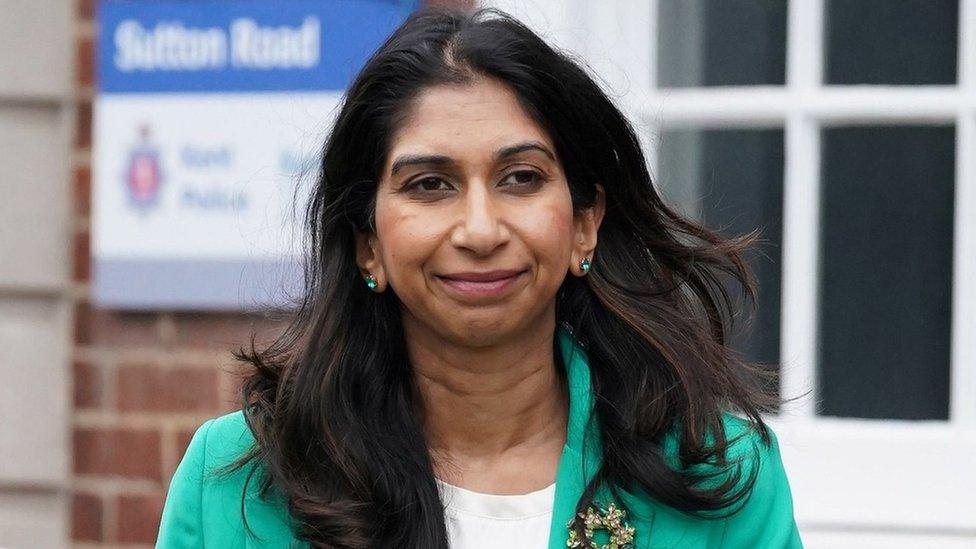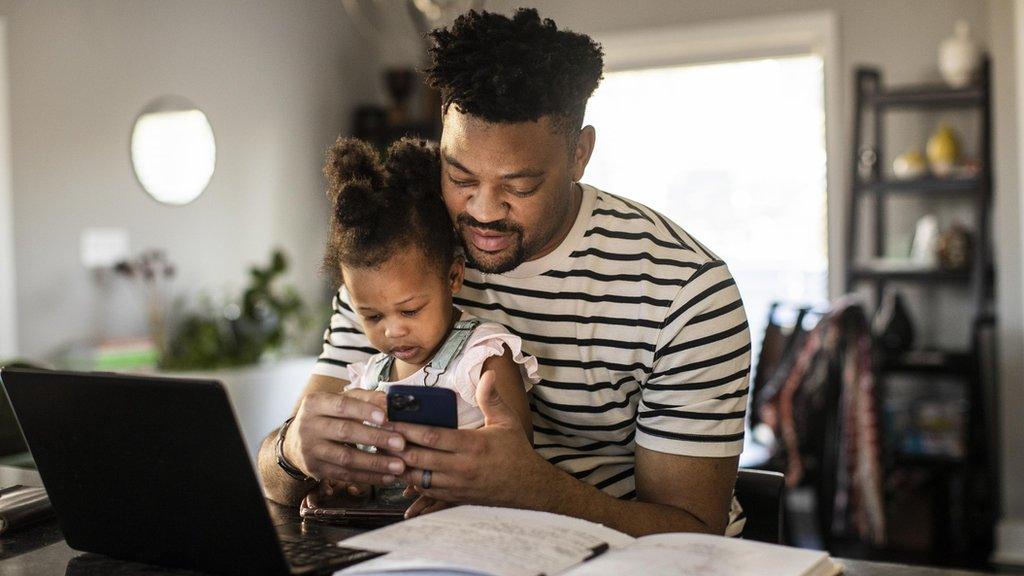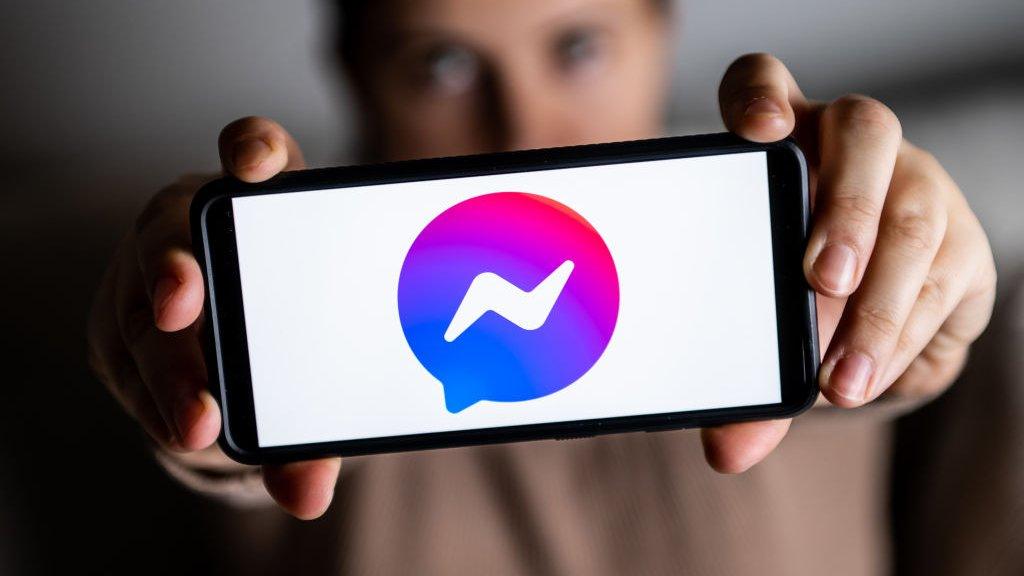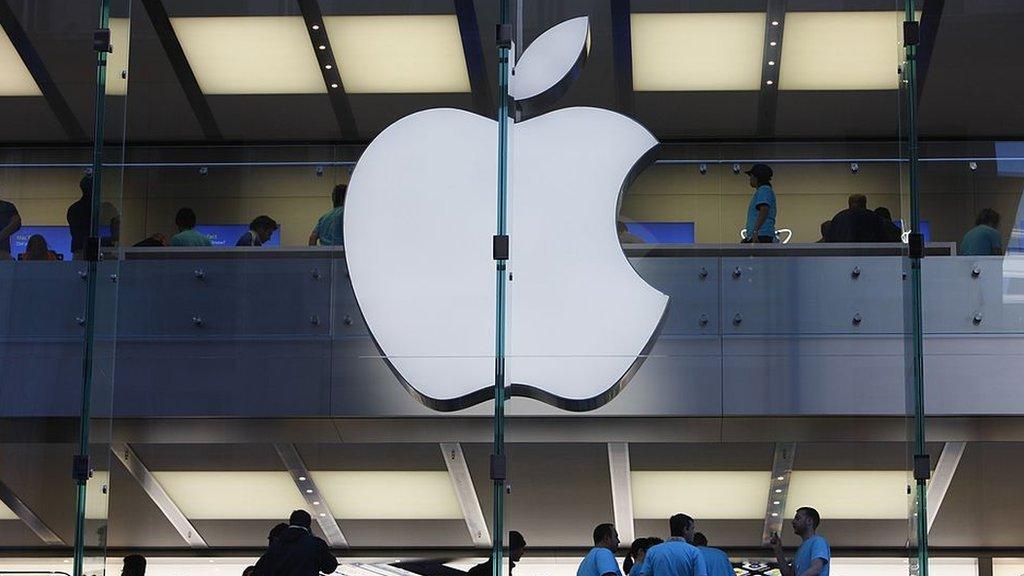Braverman and Facebook clash over private message plans
- Published

Suella Braverman said Meta must develop safeguards alongside their end-to-end encryption plans
Facebook's owner Meta has hit back at a government campaign strongly critical of its plans to encrypt messages.
Protecting messages with end-to-end-encryption would mean that they could only be read by sender and recipient.
Home Secretary Suella Braverman said encryption could not come at the cost of children's safety, amid fears it can be used to conceal child abuse.
Meta argues that encryption protects users from invasion of privacy.
"We don't think people want us reading their private messages", the firm said.
"The overwhelming majority of Brits already rely on apps that use encryption to keep them safe from hackers, fraudsters and criminals", it added.
Ms Braverman set out her concerns to Meta in a letter co-signed by technology experts, law enforcement, survivors and leading child safety charities in July.
But on Wednesday she said: "Meta has failed to provide assurances that they will keep their platforms safe from sickening abusers. They must develop appropriate safeguards to sit alongside their plans for end-to-end encryption."
This is something Meta disputes. The BBC understands that the tech firm maintains it supplied that information in July. Much of that information has now been published online.
Meta said that it had spent the last five years developing robust safety measures to prevent, detect and combat abuse while maintaining online security.
"As we roll out end-to-end encryption, we expect to continue providing more reports to law enforcement than our peers due to our industry leading work on keeping people safe", it said.
But the plans mean hundreds of child abusers could escape punishment, according to the home secretary.
The National Crime Agency's (NCA) director of general threats, James Babbage, said if the platform introduces end-to-end encryption it will "massively reduce our collective ability" to protect children.
"We are not asking for new or additional law enforcement access, we simply ask that Meta retains the ability to keep working with us to identify and help prevent abuse," he said.
The new campaign was trailed in a speech by security minister Tom Tugendhat in May.
At the time he blamed Mark Zuckerberg for the plan - criticising what he called the "extraordinary moral choice" to expand encryption.
Meta - the American company of which Mr Zuckerberg is chief executive - has announced it will add end-to-end encryption, also known as E2EE, to all Facebook messenger chats, by default, by the end of the year.
The company already owns encrypted messaging app WhatsApp. Other platforms such as Signal and Apple's iMessage also use encryption. All these platforms have criticised measures in the recently passed Online Safety Bill that might undermine the privacy of encrypted messages.
Meta writes, external: "When E2EE is default, we will also use a variety of tools, including artificial intelligence, subject to applicable law, to proactively detect accounts engaged in malicious patterns of behaviour instead of scanning private messages".
It also sets out measures the firm takes to protect children, such as restricting people over 19 from messaging teens who don't follow them.
But speaking to BBC Breakfast on Wednesday the Home Secretary said Facebook Messenger and Instagram direct messages were the platforms of choice for online paedophiles: "We are arresting in this country about 800 perpetrators a month, we are safeguarding about 1200 children a month from this evil crime.
She said there was an increasing trend of paedophiles "seeking out children online, grooming them gaining their trust and duping them into performing sexual acts, indecent acts, pornographic acts online."
Challenged as to why, given the powers in the online safety bill, it was necessary to ask Meta to stop the roll out of e2ee Ms Braverman said: "We now have wide ranging powers contained in this new legislation that enables us via Ofcom the regulator to direct companies to take necessary steps in particular circumstances.
"But I'd far rather work constructively with these social media companies. They play a valuable part in our lives"
As part of its campaign against the move, the Home Office has joined the Internet Watch Foundation (IWF) to provide a guide for parents to "advise them how best to keep their children safe if Meta does implement end-to-end encryption".
It has also supported the production of a film against Meta's plans, which includes testimony from a survivor of child sexual exploitation online.
The IWF says its data shows prevalence of the most severe forms of online child sexual abuse have more than doubled since 2020.
'Magical thinking'
Powers in the Online Safety Bill which was passed on Tuesday enable the regulator Ofcom to compel companies to deploy approved technology that would enable them to identify child sexual abuse material in encrypted messages.
Government experts say there is technology available which would allow end-to-end encryption to take place, whilst still alerting authorities to child sexual exploitation.
However many other experts argue this is "magical thinking", and that allowing scanning for child abuse content would necessarily involve weakening the privacy of encrypted messages.
Ciaran Martin, the former head of the National Cyber Security Centre, has previously told the BBC that scanning for child abuse content in encrypted messaging apps would involve processes that could undermine privacy for all users.
"Essentially it's building a door that doesn't currently exist, not into the encrypted messaging app but into devices, which could be used or misused by people who aren't interested in protecting children for more nefarious purposes", he said.

Sign up for our morning newsletter and get BBC News in your inbox.

Related topics
- Published19 September 2023

- Published24 May 2023

- Published20 July 2023
